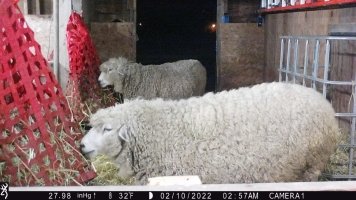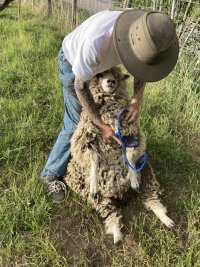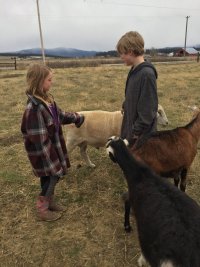Training Kids: A Sensitive Subject.
Recently we had several visitors to our farm. We offer consulting to younger farmers and folks interested in starting to raise sheep in a ‘boot camp’ for just surviving your first year and not going broke (Nope, we don’t guarantee survival or not going broke…but we offer the tools that make it a little more possible!)
This year brought more folks than anticipated and we found our pasture awash in young enthusiastic children whose parents seemed to not notice that their children had slipped into the car and joined them for the day…(in Polite Speak that means they were ignoring their children’s dangerous antics on my pasture amongst my sheep). The child in question had climbed over the gate unnoticed and was chasing the flock into the corners of the pasture to force them to break grouping and run straight back at and around him. When I asked the parent to call him out the parent stood staring as if it I has spoken in a foreign language. He possibly had never raised his voice in urgency to his child. When I quickly explained how dangerous it was the parent just froze…unable to respond..or unwilling. I asked the child to walk slowly over and come out and the child looked at his father…then turned back and ran right after the sheep. Only after going into the pasture and taking control of the sheep and blocking the child from physically assaulting them would he even look at me and acknowledge my presence. I had to firmly explain the danger he was in and finally convinced him to leave the pasture. When near his father he complained “That guy hates me”…father said nothing but just walked away hoping it would all blow over. I spent an hour extra in this class and feel good results were accomplished but I could not in good conscience sell that family sheep and expect them to maintain a safe environment for the sheep and their own children.
In the end all was well but there were lessons to be learned. Children need to know that there are limits to what they can do with and to the animals that share their world. A ram that lets his owner come up and scratch him behind the ear like a gentle dog can take umbrage to a child who is screaming commands and obscenities and chasing him around his own pasture. My 368 pound well muscled ram CAN do real damage when he takes just such umbrage.
As the afternoon unfolded the situation reached a point where gentle suggestions and guidance were being ignored outright by both parents and children. The natives had run amok!
Children are wonderful, sweet and I have had many happy years with my children and their children. I am not against children as a rule….but…I am very organized, I expect the schedule to go as expected and when parents endanger their children because of their own ignorance a little ‘training’ is required.
Anyone interested in raising sheep must acknowledge that sheep are gentle, sweet, wonderful, cute, fuzzy, warm, and dangerous. If you have sheep and you become careless to their signals and behavior or simply forget to be alert to a sudden change in behavior or direction of the flock a great deal of physical damage can occur very quickly both for you and for the sheep. Parents MUST be willing to not leave their children to their own devices when they are in with animals. In my first year or so my ram, ‘Rambo’ demonstrated his willingness to heighten my conscious awareness on many occasions….a few occasions causing a painful limp back to the house in utter defeat…but a bit better educated…
So I offer these few suggestions regarding visitors to your farm and their children.
1. Be clear about what everyone will be doing when they get to, and into, the sheep’s paddock. Be perfectly clear that the sheep are at home and everyone else is a visitor with an obligation to be on their best behavior. The health and safety of the sheep is all that EVERYONE should be thinking about. Parents or guardians have the added burden of the full responsibility for ensuring the health and safety of the child in their charge…without forgetting about the sheep!
2. Sheep can be unpredictable and very occasionally dangerous if they feel cornered, confused, pressed or get separated from their flock.
3. We NEVER CHASE SHEEP! This is NOT a suggestion…this is the single ABSOLUTE RULE that, if broken, will get you unceremoniously ejected from the property without warning or apology. (I use my serious ‘I’m watching YOU!’ face when I repeat this rule twice for full effect). Sheep can be pushed gently…not with physical contact…but by moving slowly towards them, stopping, advancing, then moving slowly around to guide them. Moving slow, with a gentle voice and consistent motion is what sheep best respond to…or grain in the hand of a person who knows where he wants the sheep!…they will follow you but you MUST stay ahead of them!
4. Children need to be taught how to move, what to expect and why sheep do what sheep do. They should be trained and accompanied by a knowledgeable and responsible adult that can run fast with a child safely tucked under one arm if necessary. I only partly jest…a child must be trained to respect the sheep and understand their behavior BEFORE they are allowed in the pasture with them. Unpredictable or rambunctious children who do not take instruction well should NEVER be allowed in with the sheep. -I have had the pleasure of introducing a hyperactive city bound, child known well for disobedience, to a flock of sheep with simple instruction to stand and watch for at least 5 minutes before moving. We discussed ‘breathing’ and ‘balance’ and why sheep need each other. Why people need each other. I watched as he spent a half hour inching towards the sheep and knelt next to one and just barely touching it to see if it was real…and if it would react. He was utterly changed by his day with the sheep! He was a great help around the farm for some time. If you can get through to the child with the most basic instruction and gain their trust the sheep will do the rest.
5. NEVER take your eyes off the child when they are in the pasture. Children are…well…children. They are VERY important members of our human flock! But they are not ‘little adults’ and we cannot expect them to act like adults or experts at…anything. They are absorbing an ever more complicated world at a dizzying speed in a way that my generation can only shake our heads in wonder and admiration. Yet they are still children and they want and need clear instruction. If you watch what is happening, the child’s movements and the sheep’s response, much can be accomplished and a safe environment maintained. If you carefully demonstrate everything that you talked about before coming into the pasture you are far more likely to have a pleasant success and an enriching instructive time than if you just open the gate and expect all will go well.
Finally children, despite what their mouths say, crave limits. They need to know where words end and action is expected…and required. They need to know that if they follow instruction that you will reward them with praise and encouragement…and more responsibility. I have never known a child who could not…or would not…learn when motivated properly. But it starts with the parent or the responsible adult controlling the environment and patiently teaching and reinforcing all of the information that they will need to be successful with sheep. Sheep can change a child’s life. Even help teach discipline and responsibility…especially if the adults in their lives demonstrate a good example of it. But we must continually be aware that sometimes this change may not be what is best for the child if they cannot, or will not, follow basic instruction. Sheep aren’t for everyone and the responsible adult making the decision must be able to decide whether or not sheep are the best fit for their family.
Recently we had several visitors to our farm. We offer consulting to younger farmers and folks interested in starting to raise sheep in a ‘boot camp’ for just surviving your first year and not going broke (Nope, we don’t guarantee survival or not going broke…but we offer the tools that make it a little more possible!)
This year brought more folks than anticipated and we found our pasture awash in young enthusiastic children whose parents seemed to not notice that their children had slipped into the car and joined them for the day…(in Polite Speak that means they were ignoring their children’s dangerous antics on my pasture amongst my sheep). The child in question had climbed over the gate unnoticed and was chasing the flock into the corners of the pasture to force them to break grouping and run straight back at and around him. When I asked the parent to call him out the parent stood staring as if it I has spoken in a foreign language. He possibly had never raised his voice in urgency to his child. When I quickly explained how dangerous it was the parent just froze…unable to respond..or unwilling. I asked the child to walk slowly over and come out and the child looked at his father…then turned back and ran right after the sheep. Only after going into the pasture and taking control of the sheep and blocking the child from physically assaulting them would he even look at me and acknowledge my presence. I had to firmly explain the danger he was in and finally convinced him to leave the pasture. When near his father he complained “That guy hates me”…father said nothing but just walked away hoping it would all blow over. I spent an hour extra in this class and feel good results were accomplished but I could not in good conscience sell that family sheep and expect them to maintain a safe environment for the sheep and their own children.
In the end all was well but there were lessons to be learned. Children need to know that there are limits to what they can do with and to the animals that share their world. A ram that lets his owner come up and scratch him behind the ear like a gentle dog can take umbrage to a child who is screaming commands and obscenities and chasing him around his own pasture. My 368 pound well muscled ram CAN do real damage when he takes just such umbrage.
As the afternoon unfolded the situation reached a point where gentle suggestions and guidance were being ignored outright by both parents and children. The natives had run amok!
Children are wonderful, sweet and I have had many happy years with my children and their children. I am not against children as a rule….but…I am very organized, I expect the schedule to go as expected and when parents endanger their children because of their own ignorance a little ‘training’ is required.
Anyone interested in raising sheep must acknowledge that sheep are gentle, sweet, wonderful, cute, fuzzy, warm, and dangerous. If you have sheep and you become careless to their signals and behavior or simply forget to be alert to a sudden change in behavior or direction of the flock a great deal of physical damage can occur very quickly both for you and for the sheep. Parents MUST be willing to not leave their children to their own devices when they are in with animals. In my first year or so my ram, ‘Rambo’ demonstrated his willingness to heighten my conscious awareness on many occasions….a few occasions causing a painful limp back to the house in utter defeat…but a bit better educated…
So I offer these few suggestions regarding visitors to your farm and their children.
1. Be clear about what everyone will be doing when they get to, and into, the sheep’s paddock. Be perfectly clear that the sheep are at home and everyone else is a visitor with an obligation to be on their best behavior. The health and safety of the sheep is all that EVERYONE should be thinking about. Parents or guardians have the added burden of the full responsibility for ensuring the health and safety of the child in their charge…without forgetting about the sheep!
2. Sheep can be unpredictable and very occasionally dangerous if they feel cornered, confused, pressed or get separated from their flock.
3. We NEVER CHASE SHEEP! This is NOT a suggestion…this is the single ABSOLUTE RULE that, if broken, will get you unceremoniously ejected from the property without warning or apology. (I use my serious ‘I’m watching YOU!’ face when I repeat this rule twice for full effect). Sheep can be pushed gently…not with physical contact…but by moving slowly towards them, stopping, advancing, then moving slowly around to guide them. Moving slow, with a gentle voice and consistent motion is what sheep best respond to…or grain in the hand of a person who knows where he wants the sheep!…they will follow you but you MUST stay ahead of them!
4. Children need to be taught how to move, what to expect and why sheep do what sheep do. They should be trained and accompanied by a knowledgeable and responsible adult that can run fast with a child safely tucked under one arm if necessary. I only partly jest…a child must be trained to respect the sheep and understand their behavior BEFORE they are allowed in the pasture with them. Unpredictable or rambunctious children who do not take instruction well should NEVER be allowed in with the sheep. -I have had the pleasure of introducing a hyperactive city bound, child known well for disobedience, to a flock of sheep with simple instruction to stand and watch for at least 5 minutes before moving. We discussed ‘breathing’ and ‘balance’ and why sheep need each other. Why people need each other. I watched as he spent a half hour inching towards the sheep and knelt next to one and just barely touching it to see if it was real…and if it would react. He was utterly changed by his day with the sheep! He was a great help around the farm for some time. If you can get through to the child with the most basic instruction and gain their trust the sheep will do the rest.
5. NEVER take your eyes off the child when they are in the pasture. Children are…well…children. They are VERY important members of our human flock! But they are not ‘little adults’ and we cannot expect them to act like adults or experts at…anything. They are absorbing an ever more complicated world at a dizzying speed in a way that my generation can only shake our heads in wonder and admiration. Yet they are still children and they want and need clear instruction. If you watch what is happening, the child’s movements and the sheep’s response, much can be accomplished and a safe environment maintained. If you carefully demonstrate everything that you talked about before coming into the pasture you are far more likely to have a pleasant success and an enriching instructive time than if you just open the gate and expect all will go well.
Finally children, despite what their mouths say, crave limits. They need to know where words end and action is expected…and required. They need to know that if they follow instruction that you will reward them with praise and encouragement…and more responsibility. I have never known a child who could not…or would not…learn when motivated properly. But it starts with the parent or the responsible adult controlling the environment and patiently teaching and reinforcing all of the information that they will need to be successful with sheep. Sheep can change a child’s life. Even help teach discipline and responsibility…especially if the adults in their lives demonstrate a good example of it. But we must continually be aware that sometimes this change may not be what is best for the child if they cannot, or will not, follow basic instruction. Sheep aren’t for everyone and the responsible adult making the decision must be able to decide whether or not sheep are the best fit for their family.






